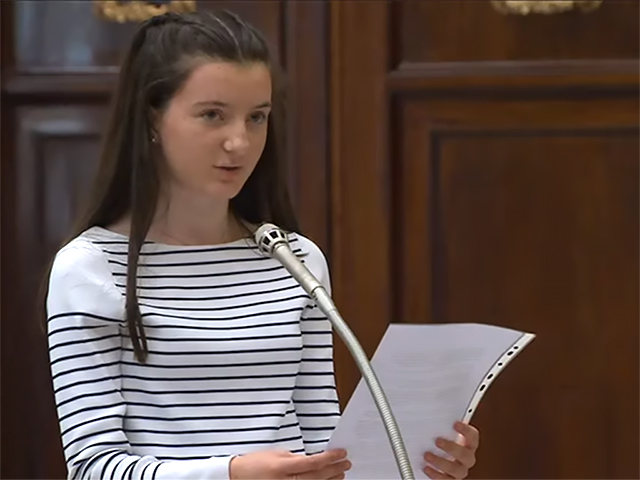
Pope Francis has met with delegates attending a four-day world congress on ‘Child Dignity in the Digital World’ and was presented with the group’s final declaration.
Streamed on facebook and YouTube, the audience saw a 16-year-old Irish girl, Muireann O’Carroll, present the ‘Declaration of Rome’ to the Holy Father.
Child Dignity Congress: Introduction
It contained 13 separate calls to action aimed at governments, businesses, legislative bodies, law enforcement, medical institutions, religious institutions and technology companies.
You can download the full declaration:
Child Dignity Congress: Declaration
The congress was hosted by the Pontifical Gregorian University’s Centre for the Protection of Minors and took place in Rome from 3 – 6 October.
Nuno da Silva Gonçalves, S.J., Rector of the Pontifical Gregorian University addressed Pope Francis ahead of the presentation of the declaration and described how an important aim of the congress was to deepen and develop collaboration:
“Facing the challenges of the digital world that does not recognize borders and in situations where the Law seems impotent, international and inter-disciplinary collaboration is indispensable for the uncompromising defence of the dignity of minors. We are confident that we have taken an important step in this process of collaboration, which it is our firm intention to deepen and develop.”
Child Dignity Congress: Rector’s Address
Pope Francis, having received the Declaration, responded with a full and wide-ranging address to delegates.
Child Dignity Congress: Papal Address
The Holy Father reflected on the modern digital world by juxtaposing wonder and admiration felt witnessing the fruits of technological advancement with concern and apprehension at the sheer pace of change – the unforeseen problems and negative consequences.
“We rightly wonder if we are capable of guiding the processes we ourselves have set in motion, whether they might be escaping our grasp, and whether we are doing enough to keep them in check.”
This speed of change can lead to bewilderment in the workings of the digital world:
“Today no one in the world, or any single national authority, feels capable of monitoring and adequately controlling the extent and the growth of these phenomena, themselves interconnected and linked to other grave problems associated with the net, such as illicit trafficking, economic and financial crimes, and international terrorism.”
In his address the Holy Father urges that we keep our eyes open to unpleasant truths – the spread of extreme pornography, the phenomenon of sexting and the growth of online bullying.
“We must not let ourselves be overcome by fear, which is always a poor counsellor. Nor let ourselves be paralyzed by the sense of powerlessness that overwhelms us before the difficulty of the task before us. Rather, we are called to join forces, realizing that we need one another in order to seek and find the right means and approaches needed for effective responses.”
In conclusion, Pope Francis said the Catholic Church would offer ‘commitment and readiness’; to protect young people in the digital world and acknowledged her own failures ‘in providing for the protection of children’:
“You have expressed the hope that religious leaders and communities of believers can also share in this common effort, drawing on their experience, their authority and their resources for education and for moral and spiritual formation. In effect, only the light and the strength that come from God can enable us to face these new challenges. As for the Catholic Church, I would assure you of her commitment and her readiness to help. As all of us know, in recent years the Church has come to acknowledge her own failures in providing for the protection of children: extremely grave facts have come to light, for which we have to accept our responsibility before God, before the victims and before public opinion.
“For this very reason, as a result of these painful experiences and the skills gained in the process of conversion and purification, the Church today feels especially bound to work strenuously and with foresight for the protection of minors and their dignity, not only within her own ranks, but in society as a whole and throughout the world.”